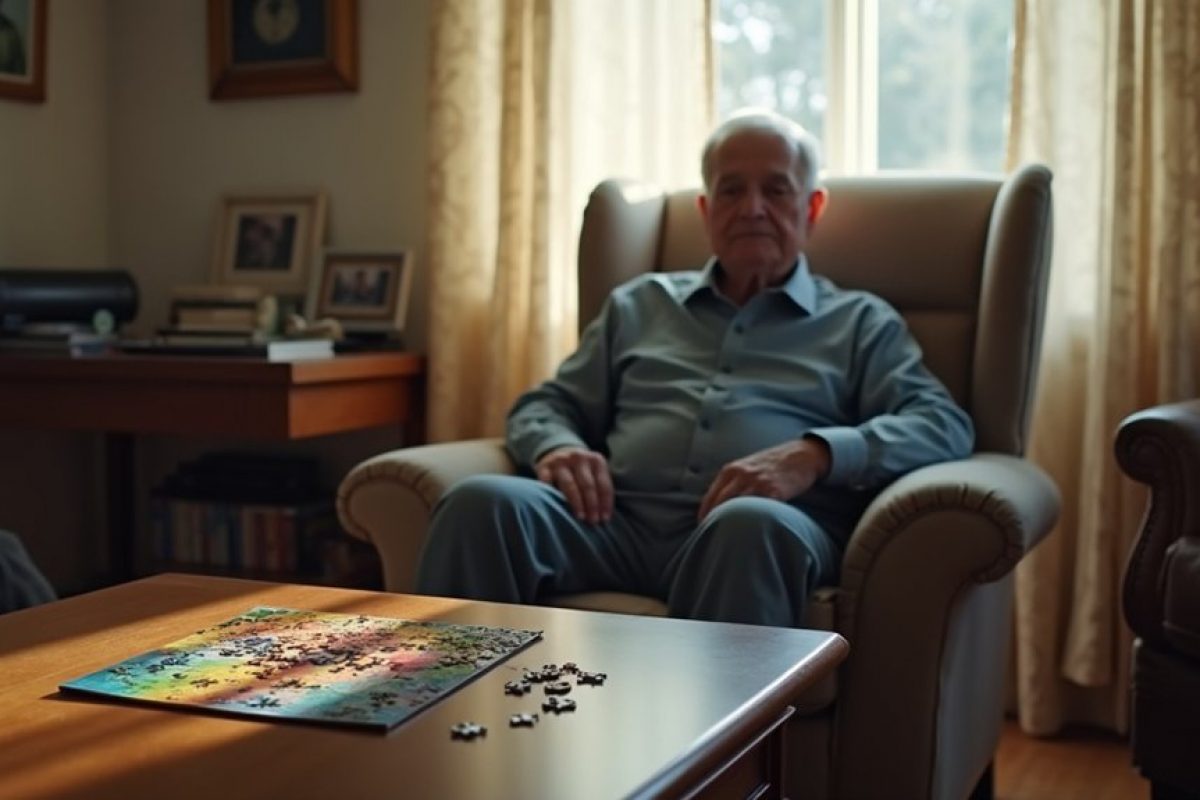Recognizing the first behavioral signs of dementia can be crucial for providing support. You might notice changes in memory and recall, like forgetting recent events or familiar names. Problem-solving and planning may become challenging, making tasks feel overwhelming. Social withdrawal and altered moods, such as anxiety or irritability, could occur. Confusion about time and place, as well as frequently misplacing items, might also become common. Understanding these signs can help you respond effectively, offering further insights ahead.
Key Takeaways
- Difficulty remembering recent events or familiar names often indicates the onset of dementia.
- Struggles with problem-solving, like organizing tasks or following recipes, are common early signs.
- Withdrawal from social activities and emotional changes, such as mood swings, can signal behavioral changes.
- Confusion about time and place, including misplacing items or disorientation, may arise in early stages.
- Establishing a supportive environment can help manage behavioral signs and improve quality of life.
Changes in Memory and Recall
As you interact with someone showing signs of dementia, you might notice significant changes in their memory and recall abilities. They may struggle to remember recent events, conversations, or even familiar names. This can be disheartening for both you and them.
In home care settings, it’s essential to create an environment that encourages familiarity and comfort. Use memory aids, like photo albums or reminders, to help jog their memory. Engage them in simple conversations about past experiences, which can spark recognition and joy.
Patience is key; offer gentle prompts without frustration. By understanding and addressing these memory challenges, you can provide compassionate support, helping them feel valued and connected despite the changes they’re experiencing. Furthermore, providing a safe and secure environment can significantly reduce anxiety and confusion, enhancing their daily life.
Difficulty With Problem-Solving and Planning
When someone is experiencing dementia, you might notice they struggle with problem-solving and planning tasks that once seemed simple.
Everyday activities, like organizing a grocery list or planning a family event, may become overwhelming for them. They might have trouble following a recipe or managing their finances, leading to frustration and confusion.
These changes can affect their independence, making it essential for you to offer support. Encourage them by breaking tasks into smaller, manageable steps. Use visual aids or written reminders to help guide them. This approach can enhance their overall quality of life and make daily tasks feel less daunting.
Patience and understanding are key; remember, it’s not about the task’s completion but about making them feel supported and empowered. Your presence can make a significant difference in their ability to navigate these challenges.
Withdrawal From Social Activities
Many individuals with dementia gradually withdraw from social activities, often due to feelings of confusion or anxiety in social settings.
You might notice a loved one avoiding gatherings, refraining from inviting friends over, or declining outings they once enjoyed. This withdrawal can signal their struggle to engage, making it essential for you to reach out and offer support.
Encourage participation in smaller, more comfortable environments where they feel safer. Be patient and understanding, as this change can be disheartening for them. Additionally, it’s important to recognize that care coordination is a significant source of stress for caregivers, highlighting the need for support in managing these changes.
Altered Mood and Emotional Responses
Signs of altered mood and emotional responses can often emerge in individuals with dementia, impacting their interactions and overall well-being.
You might notice sudden mood swings, where a person shifts from joy to sadness or anger without clear reason. This unpredictability can be distressing not just for them, but for those around them.
They may become overly anxious or irritable, reacting strongly to situations that previously seemed manageable. Understanding these changes is crucial; it helps you respond with compassion rather than frustration.
Providing a calm environment, validating their feelings, and offering support can make a significant difference. Additionally, gaining insight into the brain’s behavior can empower caregivers to better understand these emotional shifts.
Confusion About Time and Place
As emotional shifts become more pronounced, confusion about time and place often follows for individuals with dementia. You might notice a loved one struggling to recognize familiar surroundings or becoming disoriented about the time of day.
They may ask repetitive questions about where they’re or when someone will arrive. This confusion can be distressing for them and may lead to feelings of anxiety or frustration.
It’s important to approach these moments with patience and reassurance. Gently orient them by using clear cues, like a calendar or familiar objects. Early diagnosis and preventive strategies are essential for managing dementia and improving patient outcomes.
Decline in Personal Care and Hygiene
A noticeable decline in personal care and hygiene can be one of the more challenging signs of dementia. You might observe that your loved one neglects basic grooming tasks, such as bathing or brushing their teeth. Their clothes may become unkempt, or they might wear the same outfit for days.
This shift can stem from a loss of motivation, memory issues, or confusion about daily routines. It’s important to approach the situation with empathy. Encourage gentle reminders or offer assistance without judgment.
You can create a supportive environment by establishing a consistent schedule for personal care activities. By doing so, you help maintain their dignity and promote their overall well-being, ensuring they feel valued and cared for during this difficult time. Implementing personalized care plans can significantly enhance their quality of life and address their unique needs more effectively.
Changes in Communication Skills
When you notice your loved one struggling to find the right words or frequently repeating themselves, it could indicate changes in their communication skills linked to dementia. You might observe them having difficulty following conversations or understanding jokes, which can be frustrating for both of you.
Changes in communication skills, such as word-finding difficulties and repetitive speech, may signal dementia in your loved one.
They may also switch topics abruptly or use unusual words, making it hard to connect.
To support them, be patient and give them time to express themselves. Encourage open dialogue by asking simple questions and providing gentle prompts. Additionally, look for signs of subtle memory changes, as these can often accompany communication difficulties.
It’s essential to create a comfortable environment where they feel safe communicating. By being attentive to these changes, you can help foster meaningful interactions that maintain their dignity and connection to those around them.
Increased Anxiety and Agitation
Increased anxiety and agitation often emerge as dementia progresses, making everyday situations feel overwhelming for your loved one.
You might notice them becoming restless, pacing, or expressing frustration over simple tasks. These reactions can stem from confusion or a sense of loss of control.
It’s crucial to approach your loved one with patience and empathy during these moments. Offering reassurance, maintaining a calm environment, and engaging in comforting activities can help alleviate their distress.
Recognizing triggers, whether it’s noise, unfamiliar faces, or changes in routine, allows you to create a more supportive atmosphere. Additionally, utilizing respite care services can provide you with much-needed breaks, allowing you to recharge and better support your loved one.
As you navigate these challenging behaviors, remember that your understanding and compassion can greatly impact their comfort and sense of security.
Misplacing Items and Losing Things Abnormally
As anxiety and agitation mount, you may notice your loved one misplacing items or losing things more frequently. This behavior can be distressing, not just for them but for you as well.
They might forget where they’ve placed their keys, wallet, or even important documents, leading to frustration and confusion. You may find them searching for things in unusual spots or accusing others of taking their belongings.
It’s essential to approach these moments with patience and understanding. Creating a designated spot for frequently used items can help reduce this confusion. Gently reminding them of where things belong can also foster a sense of security. Regular respite care allows caregivers to take breaks and manage their own well-being, which can ultimately lead to a more supportive environment for their loved ones.
Frequently Asked Questions
What Are the Early Warning Signs of Dementia?
When you’re noticing early warning signs of dementia, you might see changes in memory, like forgetting recent events or repeating yourself.
You could also find it hard to focus or follow conversations. Mood swings and withdrawal from social activities may occur, too.
If someone’s struggling with daily tasks or showing confusion about time and place, it’s essential to approach the situation with compassion and understanding, as these signs can deeply impact their well-being.
How Can I Support a Loved One Showing Signs of Dementia?
If your loved one is showing signs of dementia, start by being patient and understanding.
Listen to their concerns without judgment, and encourage open conversations. Help them maintain routines, as familiarity can be comforting.
Engage in activities they enjoy and offer support with daily tasks. Consider joining a support group for both of you, as sharing experiences can be beneficial.
Your presence and compassion will make a significant difference in their journey.
When Should I Consult a Doctor About Dementia Symptoms?
When you notice persistent changes in memory, behavior, or cognitive abilities, it’s time to consult a doctor.
If your loved one struggles with daily tasks, confuses time or place, or experiences mood swings, don’t hesitate to seek professional advice.
Early intervention can make a significant difference. You’re showing care by addressing these symptoms, and a doctor can provide guidance and support for both you and your loved one.
Are There Lifestyle Changes That Can Help Prevent Dementia?
Yes, there are lifestyle changes you can make to help prevent dementia.
You should focus on staying physically active, eating a balanced diet rich in fruits and vegetables, and engaging your brain with puzzles or learning new skills.
Socializing regularly is also essential, as it keeps your mind sharp.
Don’t forget to manage stress through mindfulness or relaxation techniques.
These simple steps can make a significant difference in your overall brain health.
What Resources Are Available for Caregivers of Dementia Patients?
There are plenty of resources available for you as a caregiver. Local support groups provide a space to share experiences and gain insights.
Online forums and websites, like the Alzheimer’s Association, offer valuable information and tips. Books and articles can also enhance your understanding of dementia.
Don’t forget about respite care services; they give you a much-needed break. Reaching out to professionals can help you navigate the challenges you face, too.





